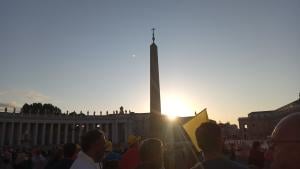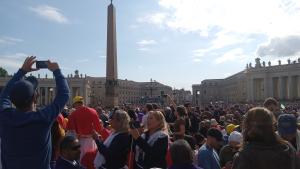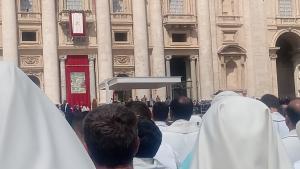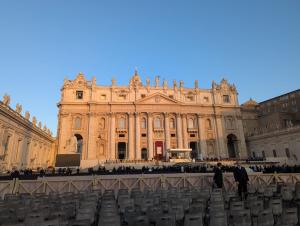When my alarm rang at 3 a.m. this morning, I didn’t hesitate. Maybe the jet lag was still working in my favor (I’ve been in Rome for only three days); maybe I knew in my bones how important it was to get up early and be a part of something important this morning: Pope Leo XIV’s inaugural Mass.
I showered, dressed, packed my backpack, and hurried down to the lobby of the monastery where I’m staying on Rome’s Aventine hill to meet the students I’m accompanying on an educational trip run by the small Catholic liberal arts college where I teach. As we set out along the Tiber River, I was admittedly not looking forward to the prospect of waiting hours and hours for a Mass I might not be able to get into.
But much to my surprise, we were allowed into the square. And not only that – while I’d expected we’d be standing for the liturgy’s duration, the square had been filled with chairs. My group got to sit right up near the front, as close to the main altar as possible for the laity. After another hour went by, I turned around to see the square filling up with people waving flags from India, Spain, France, Mexico, Ukraine, Peru, and, yes, the United States of America. Seeing a Chicago flag was indeed a special delight – one of my students regretted not bringing his White Sox hat!
The solemn Mass – conducted mostly in Latin with nods to various other languages, including the Greek used by the Church of the Eastern rite – was truly an experience of communion. Singing the opening litany of the saints with neighboring congregants from Milan, Peru, Poland, and Brazil, I felt connected to everyone in the space, and through them, connected to God. Leo’s papacy, while very new, is already emerging with a clear message of the need for unity and peace. In his homily he stressed the need to stand united as one:
Brothers and sisters, I would like that our first great desire be for a united Church, a sign of unity and communion, which becomes a leaven for a reconciled world. In this our time, we still see too much discord, too many wounds caused by hatred, violence, prejudice, the fear of difference, and an economic paradigm that exploits the Earth’s resources and marginalizes the poorest.
For our part, we want to be a small leaven of unity, communion and fraternity within the world. We want to say to the world, with humility and joy: Look to Christ! Come closer to him! Welcome his word that enlightens and consoles! Listen to his offer of love and become his one family: in the one Christ, we are one. This is the path to follow together, among ourselves but also with our sister Christian churches, with those who follow other religious paths, with those who are searching for God, with all women and men of good will, in order to build a new world where peace reigns!
After I got past the initial shock when the US-born pontiff’s election was announced ten days ago, I am growing more and more optimistic that Leo is the right person to hold Peter’s keys at this moment. At a time when humanity is dealing with multiple wars, environmental degradation, and autocracy on the rise in so many parts of the world – including the two countries this pope calls his own – Leo is showing that the Christian message is all the more relevant.
When I began writing for this blog back around 2012, I was deeply struggling with my personal faith as well as what I viewed as the irrelevance of the Catholic Church to the world in the twenty-first century. I’d recently learned about the threat of AI – the very idea of which seemed to rob human beings of our dignity. As a graduate student in the humanities, I was mostly surrounded by people who believed that there is nothing beyond the material realm. The Church as I knew it seemed out of touch with the problems I saw in the world.
When Francis became pope, he offered a new perspective. At this time I also moved to Dubuque, Iowa – a small Mississippi River town that holds the highest concentration of European-American Catholics in the US. There, I got to know communities of religious sisters engaged in immigrant solidarity work and environmental sustainability; I got involved with the Catholic Worker Movement; I met serious scholars of theology who showed me that the Church does indeed have a message for the world of today.
For the past several years I’ve been researching polarization and division within the Church – something that Leo clearly has little patience for, instead urging us to find common ground: “We are called to offer God’s love to everyone, in order to achieve that unity which does not cancel out differences but values the personal history of each person and the social and religious culture of every people,” he said in his homily.
But some commentators have noted that a greater problem in the Church is not disunity, but disengagement. Though Christ’s greatest commandment was for us to love one another, this love is not the reputation that Christians have earned for ourselves. More often we are known for intolerance, for judgment, for using our faith to justify whatever we see fit, from destruction of the earth to colonization. But this was not Jesus’ message. And now, I truly hope that Leo XIV will help us all to reconnect with the basics of the Christian message, sparking conversion, discernment, and renewed commitment to Jesus’ mission in us all. The final words of his homily say it best:
Brothers and sisters, this is the hour for love! The heart of the Gospel is the love of God that makes us brothers and sisters. With my predecessor Leo XIII, we can ask ourselves today: If this criterion ‘were to prevail in the world, would not every conflict cease and peace return?’ (Rerum Novarum, 21).
With the light and the strength of the Holy Spirit, let us build a Church founded on God’s love, a sign of unity, a missionary Church that opens its arms to the world, proclaims the word, allows itself to be made “restless” by history, and becomes a leaven of harmony for humanity. Together, as one people, as brothers and sisters, let us walk towards God and love one another.
















